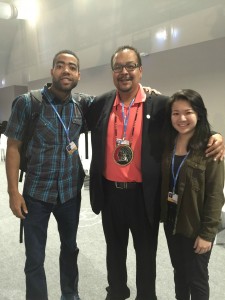On our first day, we went to the Forum for informal consultation with indigenous peoples on a proposed Platform for Indigenous Peoples, pursuant to paragraph 135 (non-party stakeholders) in the Paris Accord. Very few “parties” (state actors) attended–Bolivia and Ecuador seem to have spearheaded this effort; Australia, the EU, Sweden, Canada, Panama and a few others participated. There were many indigenous people observing, and several at the table speaking.
The purpose of the meeting was to “gather views and share information” from indigenous people, a demographic with a legacy of oppression. It is extremely unfortunate that while these countries contribute the least to CO2 emissions, they are also the ones who feel the full effects of climate change and are most heavily impacted. In moving forward, it is critical that they have the opportunity and voice to contribute to the design and implementation of actions. The First Nations spokespersons insisted that this must be a fully participatory process and that they must be active drivers of change, not passive agents.
I admired and respected how the representatives of indigenous peoples highlighted a common theme in their discussions: the importance of understanding the spiritual, traditional, and cultural dimension of knowledge. Walter Schuldt from the Permanent Mission of Ecuador to the United Nations pressed, “We must see Mother Earth as an integral part of nature, as human.” He stated that our collective responsibility to defend nature means that there must be legal implications to any violations against nature.
Kevin Hart, the Manitoba Regional Chief for the Assembly of First Nations, spoke on behalf of the Canadian delegation. He was joined by an elder from British Columbia who said, “Mother Earth can live without us; we cannot survive without Mother Earth,” and who spoke in opposition to a new hydroelectric dam at Fort St. John. Both Hart and the elder expressed their dissatisfaction with the lack of engagement and action. They emphasized that the first step in addressing climate change is to possess full awareness of the holistic issue at hand. The chief elder said, “We are stewards of the land. Our connection to the land is first and foremost based on the teachings that have been passed down in the memorial…Protecting the land and water is not an indigenous issue; it is a human issue.” Hart pressed for full respect of the constitutional treaty and for inherent human rights, supported by all levels of the government. He stated, “I’ve been to a lot of these meetings now, and we really need to move ahead.”

Ecuador and Bolivia, who seem to have pressed for this meeting, had several proposals for moving forward with the Platform. Bolivia suggested that there be indigenous peoples’ sessions at each COP and that the UN work to set up more meetings among indigenous peoples. Victoria Tauli-Corpus, the UN Special Rapporteur on the Rights of Indigenous People added that there should also be more virtual exchange of ideas and information on extending technologies of indigenous peoples, perhaps by means of a common website. She also said the Platform should be adopted at the next session of COP, and there should be a high level meeting of indigenous peoples’ technology at COP23.The representative from Ecuador suggested as well that there be an “Action agenda” for a full day on indigenous peoples at COP 23.
There was a state delegation from the EU at this meeting, and while they emphasized their support for human rights, including those of indigenous peoples, and with sharing technological best practices of indigenous peoples, they expressed a need for clarification about the platform and how and where it will fit into the framework and architecture of Paris. They seemed to be less ready to move forward with speed than did others in the room. We asked several parties (state representatives) and they suggested that the EU was somewhat wary because someone would have to pay for whatever was enacted, and/or that the EU was interested in maintaining control over the Paris process.